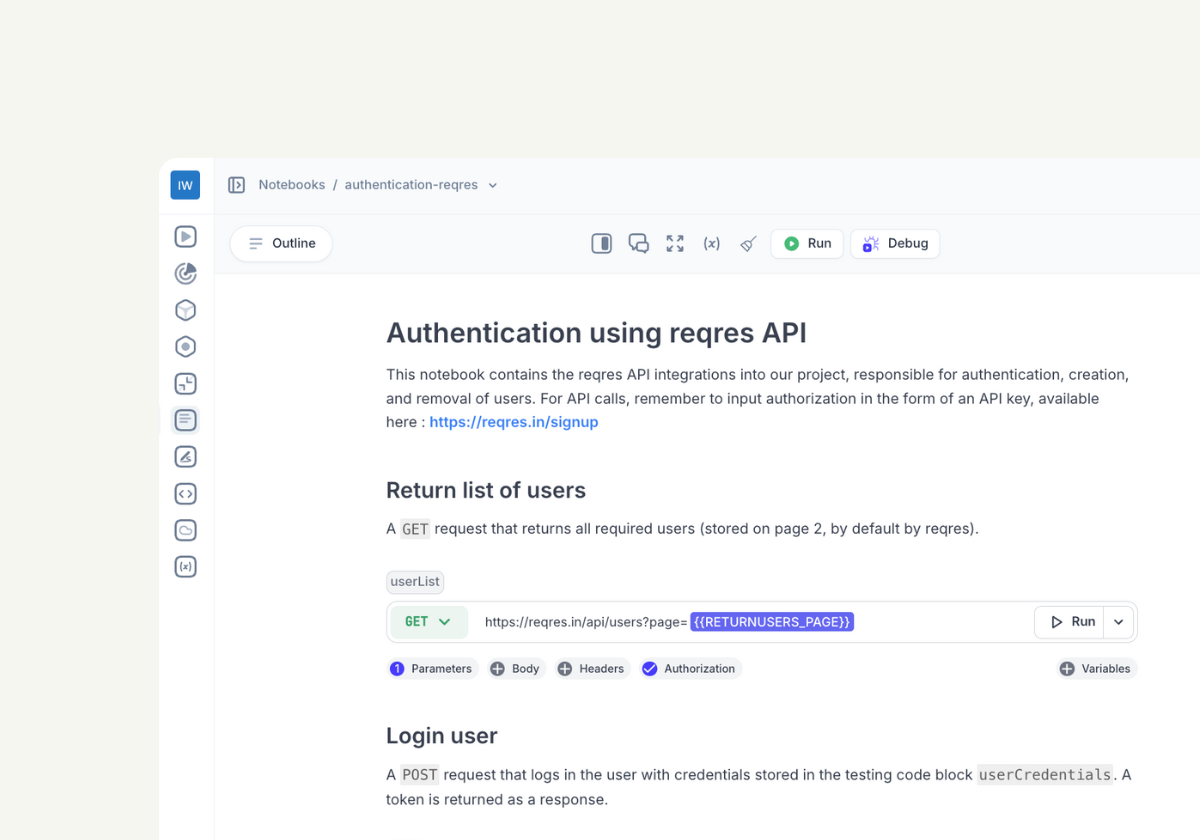Design complex API
integrations
Design API integrations that are faster to implement, easier to maintain, and ready to scale.
“We can finally design API integrations with everything visible from the start: from edge cases, to dependencies, to design decisions.”
Stop designing in the dark. Know your APIs. Understand your system.

Problem
- Suboptimal designs due to missing system context and outdated API docs
- Poorly scoped APIs that ignore end-user needs and result in poor usability, complexity, and high support costs
- Redesigns caused by siloed work, unclear ownership, cross-team miscommunications, or evolving teams
- Difficulties simulating failure scenarios or validating retry logic until too late in the lifecycle
- Static design that doesn’t withstand change and can’t be reworked easily
Solution
- Resilient, scalable API integrations grounded in real-world system knowledge, and always-up-to-date API docs
- A single source of truth with structured request/response examples, call sequences, and simulated behaviors
- A shared, collaborative space, where stakeholder input and edge cases are captured as part of the design
- Built-in sandbox for mock APIs and real-world validation, to test API flows early and thoroughly
- Future-proofed API integrations with full visibility into dependencies
Design for performance, reliability, and change
Validate assumptions early with API Blocks: explore how the auth endpoints behave, what tokens are returned, and what’s required in each request.
Instead of waiting until implementation, teams can interactively test login, registration, and token exchange flows and document how they work, using real request/response examples.

Start today for free
pairs with
End-to-end debugging
Capture everything you need to resolve a bug—from frontend screens, backend traces, metrics, logs and full request/response content and headers—without having to dig through APM data.Try it nowpairs with
AI-powered debugging
With MCP support, stream real-time, full-stack runtime data directly into your favorite AI tool / IDE. You can fix complex bugs faster without ever leaving your workflow.Try it nowSophisticated API integrations need tools that support more than endpoints
Designing API integrations isn’t just about making requests. It’s about aligning with system architecture, anticipating change, and creating scalable, maintainable workflows from day one.| Feature | API Tools | Multiplayer |
|---|---|---|
| Test API calls | ||
| Collaborate with external teams (Devs, Partners, QA, CS, etc.) | ||
| Write and run inline code within API workflows | ||
| Chain API and code blocks together | ||
| Test multi-step integrations | ||
| Debug with full session capture | ||
| Embed explanations, ADRs, design notes | ||
| Embed graphs and tables |
Why choose Multiplayer Notebooks for API design?

Architecture-aware design
Design integrations with full visibility into system architecture, dependencies, and runtime behavior—so nothing is built in isolation or based on outdated assumptions.
Real-time API exploration and validation
Run real API calls with headers, bodies, and auth directly in the Notebook to validate endpoints early. No more guessing what an API might do.
Integrated code and flow simulation
Prototype business logic and chain API calls together to simulate full integration flows before implementation. Test edge cases, fallback logic, and response handling early.
Shared context and design rationale
Document decisions, tradeoffs, and technical constraints alongside the integration plan, so everyone from devs to stakeholders knows why it was built that way.
Collaboration without silos
Bring backend, frontend, platform, and product into one shared design surface, eliminating misalignment and reducing costly handoffs or rework.
Future-proofed and maintainable
By combining live system data, linked documentation, and design history, your integrations are resilient to change and easy to evolve over time.Design API integrations that get it right from the start
Use Multiplayer, build better API integrationsTry it nowTalk to one of our experts and see Multiplayer in action.
Get 1 month free to test all our features and experience the full power of Multiplayer.
Check out our in-depth technical documentation.
Best practices on software architecture, system design, debugging, and observability.